Published May 9, 2021
The Unique Experience of Motherhood in the Delta Quadrant
Charting a course to good parenting thanks to lessons learned from Star Trek: Voyager
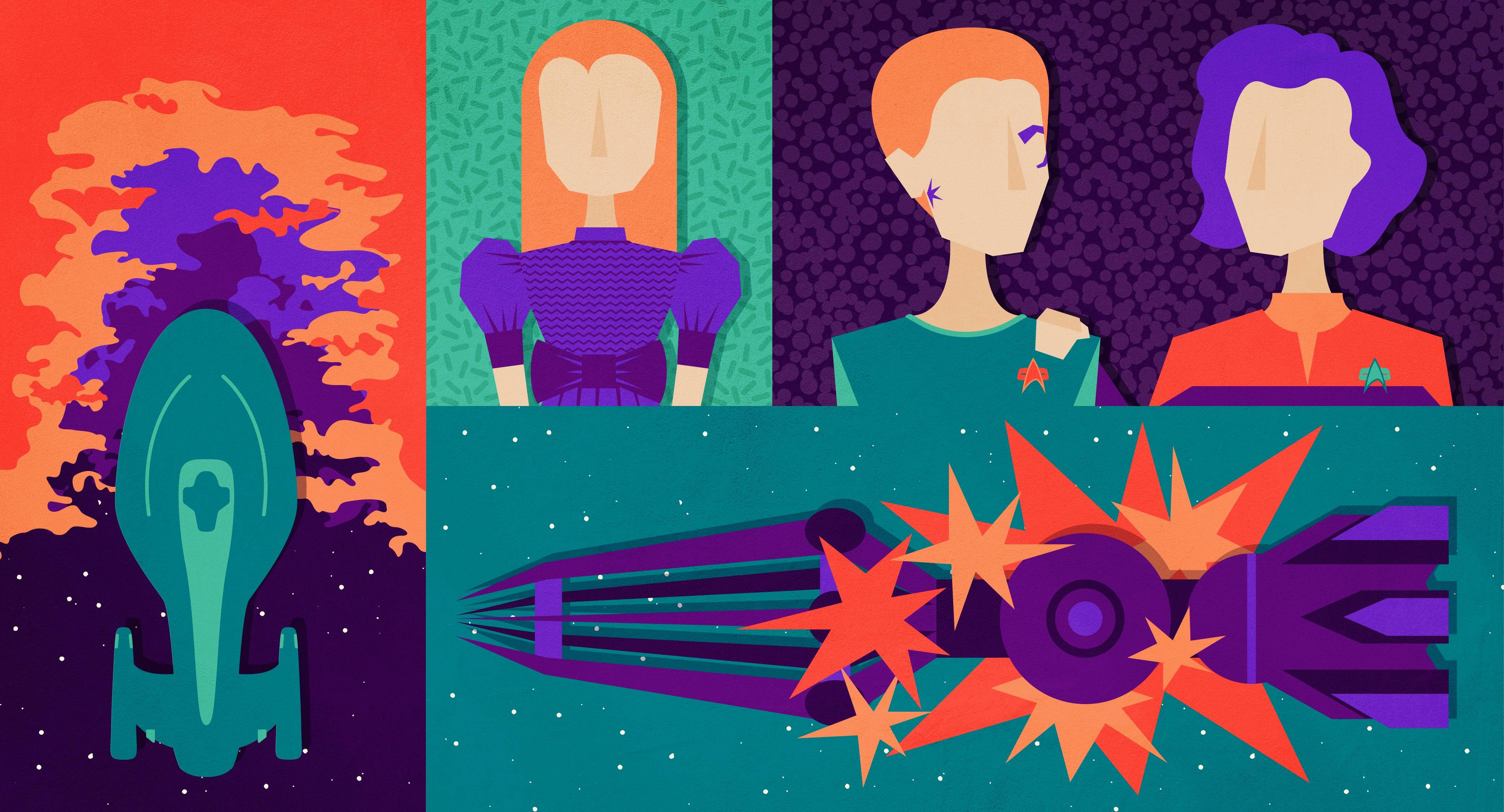
StarTrek.com
My relationship with Star Trek: Voyager is only as old as my daughter, two and a half years. My wife and I started watching the series together just after she was born, and I think the post-partum hormones coursing through my body during my kid’s first months have a lot to do with the connection I have to this series. In my recent rewatch of Voyager, uncomplicated by hormones and exhaustion, I saw it through a more critical eye. I recognize the underdeveloped characters, the dropped plot lines, and the cringeworthy stereotypes (Kazon, blech). But while I can see where criticism of Voyager comes from, Voyager still holds a special place in my heart and I believe that’s because, more than any of the other Trek series, its core themes are deeply rooted in parenthood. It’s about all of the confusion and terror that comes with being a first time parent — and let me tell you, it’s truly like being plucked from all that you knew and dropped into an unknown part of space.
Here are five Voyager episodes that unpack concepts of parenthood in uniquely Voyager ways.
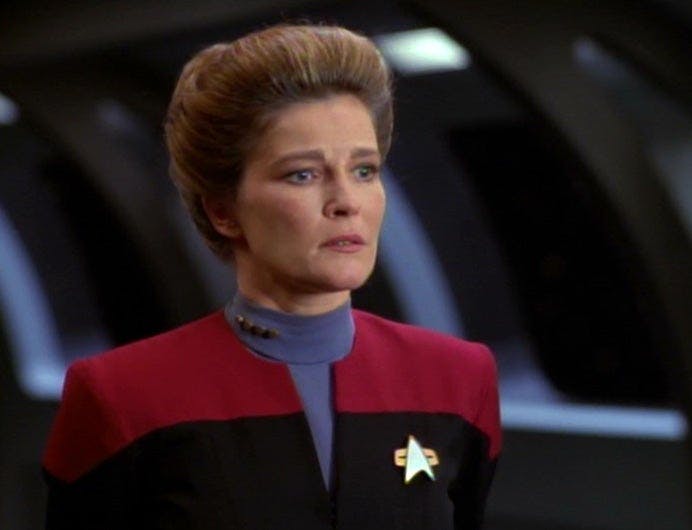
StarTrek.com
This early episode tees up a lot of themes that recur through the series: Neelix and The Doctor’s outsider status, Kes being more than meets the eye, the ongoing and awkward mishandling of Chakotay’s non-specific Indigenous heritage, Tom Paris’ early sexism. “The Cloud” establishes all the major characters around Janeway as she begins her journey toward realizing she is essentially a surrogate parent to a crew orphaned by time. She has to connect with them in a way that is entirely antithetical to her approach to leadership. And she does! With B’Elanna she uses science, Chakotay philosophy, Neelix food, and Tom friendship. Janeway even says, “I must find a way to be more than a captain to these people, but it’s not clear to me exactly how to begin.” Janeway struggles between seeking out joy — even if it’s just a silly pool game hustle — and the immense responsibility of keeping her crew alive. This multitasking arrangement very much speaks to that same stress of first time parenthood. It’s terrifying, and everything is strange and unexplained. Every squeak or sigh is genuinely frightening. Then it turns out it was just a fart, and you breathe a sigh of relief and seek joy once again.
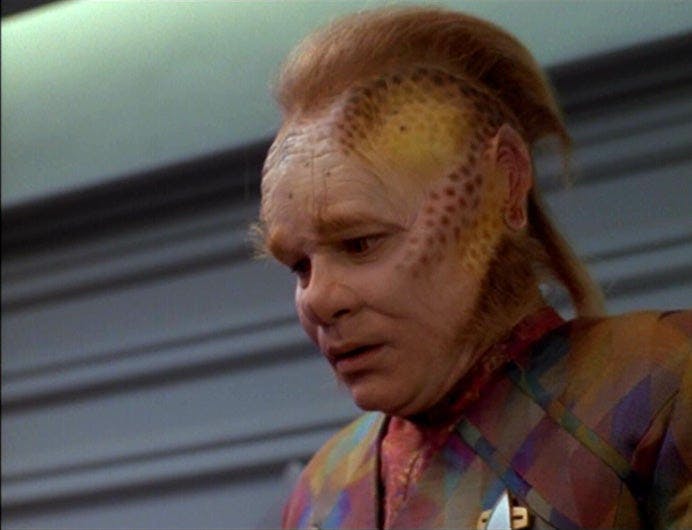
StarTrek.com
There are many ways to dissect this episode. It’s about women’s choice, toxic masculinity, and how people experience the biological clock that puts an undue pressure of time on an incredibly complex decision. During the “should we have kids?” talks I had with my partner, I didn’t lock myself in the sickbay with a hologram Doctor, but I did burst into tears and scream “I’m not ready!” when I was drunk on the Fourth of July. We didn’t come back to the topic for a year. While I was the one who carried our baby, I actually identified with Neelix in this episode. It was me who was terrified and uncertain and drowning in self-doubt. It took me some time (and a few conversations with my own Tuvoks) to realize I wanted this. I suspect some viewers were annoyed by the whole flip-flopping storyline between Kes and Neelix as they navigated Kes’s elogium, but it actually rang very true for me. Tuvok’s advice to Neelix is accurate and profound, "However, I must point out that as illogical as it seems, being a father [parent] can have infinite rewards. Far more than would seem possible. My children occupy a significant portion of my thoughts, now more than ever."
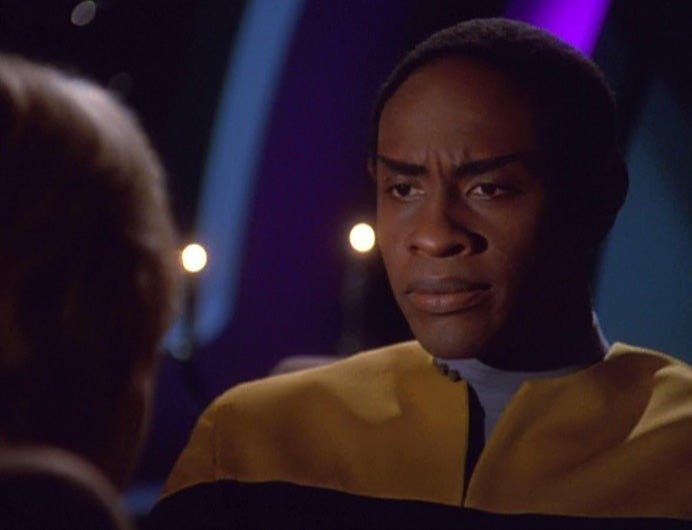
StarTrek.com
I’m a big fan of Dario Argento’s technicolor splatterfest Suspiria, so my hope was this episode introducing us to the Other Caretaker was going to be some sort of evil Jungian Mothers archetype. Alas, this ended up being a quasi-bottle episode that also closed the book on the “other Caretaker” storyline. However, “Cold Fire” does begin one of my favorite parental threads of the series, which is that Tuvok is the Best Dad. As Kes is pulled between father-figures Tanis and Tuvok, both attempting to teach her to tap into her psychokinetic powers, we get a peek into Tuvok the father, who left four Vulcan children behind. He’s training Kes with the same compassion and love he would have been training his sons and daughter in their own mental abilities had Voyager not been lost. Tuvok is an endlessly wholesome character, and his gentle and patient teaching (even after Kes accidentally almost kills him by boiling his blood with her mind) reminds us that Tuvok is so much more than a Security Officer.
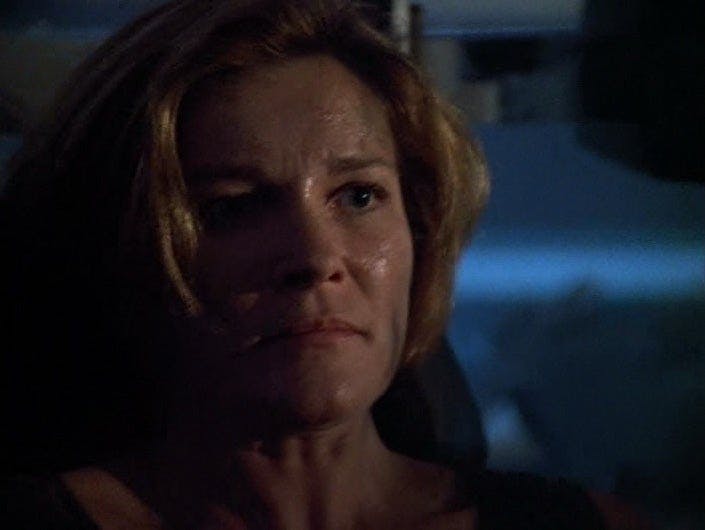
StarTrek.com
Parenthood isn’t at the forefront of this intense two-parter (to which Battlestar Galactica’s “33” owes a considerable debt), but it quietly captures an important theme, parental sacrifice. Throughout the Voyager’s battle against Annorax and his timeline tampering, the entire crew spend a year of hugely selfless acts for one another. Tuvok goes blind protecting Seven, Chakotay and Tom face conflict in their desperation to protect their family from afar, and Janeway literally runs into the fire and later insists on going down with the ship in a final standoff, a reminder that she also feels an intensely protective connection to the ship itself. “Year of Hell,” is not only an example of how when Voyager gets it right it really gets it right, the episode also has themes of familial sacrifice jammed into every nook and cranny of a standout storyline in the series.
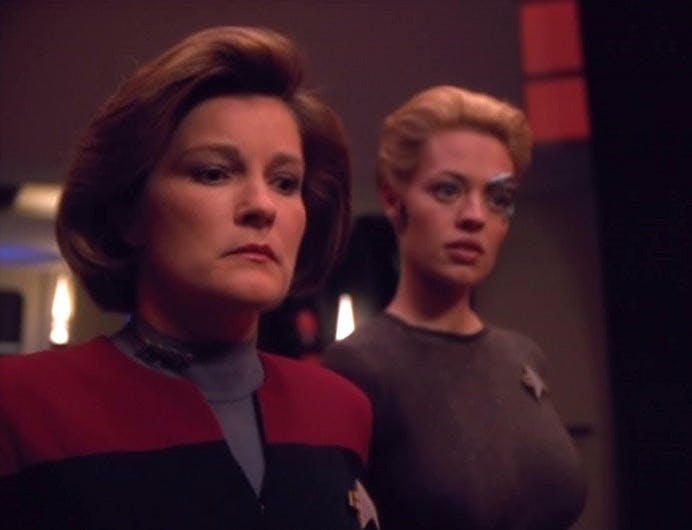
StarTrek.com
Janeway and Seven of Nine’s relationship is one of the most celebrated from Voyager. Love to all my J7 shippers, I see you, but for me, this was Voyager’s best examination of motherhood. Viewers witnessed Seven and Janeway’s relationship unfold since the Borg’s arrival on Voyager in season four, and the interplay between the two is some of Voyager’s finest character development. While the primary theme in the aptly named “Hope and Fear” is Janeway’s optimism and Seven’s apprehension about the prospect of returning to Earth, it is also, of course, about the crew’s adoption of Seven into their family. The most accurate part is Seven’s teenage-like rejection that has her lashing out of her adopted mother’s values, but like a good mom, Janeway keeps pushing Seven to understand and work through her feelings. It’s every fight I ever had with my mom between the ages of 13 and 20.
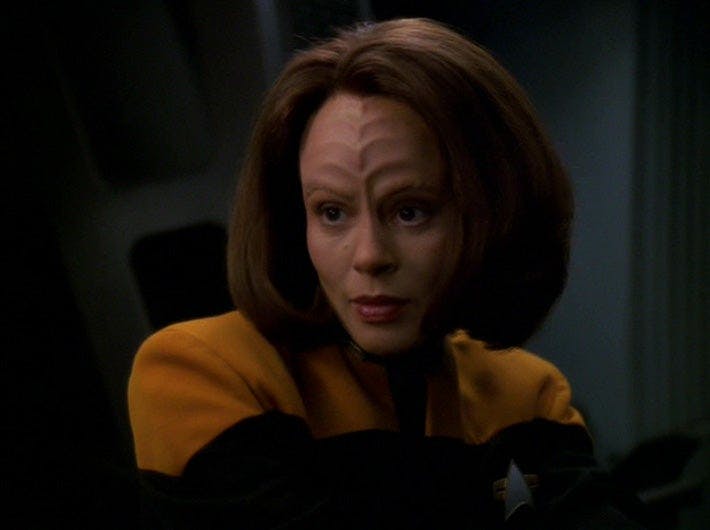
StarTrek.com
I was annoyed when Voyager introduced its B’Elanna Is Pregnant storyline because I think pregnancy stories are almost always lazy and result in sidelining the pregnant character. However, I was pleasantly surprised by how they handled “Lineage!” Up to that point, B’Elanna’s issues with her Klingon heritage had been simmering across the series and were now coming to ahead in a natural way. This episode about B’Elanna’s fears felt true to the experience and really resonated with me. I had a pretty easy pregnancy physically; no morning sickness, not too much fatigue, and basically looked like I shoved a basketball under my t-shirt, but mentally, I spent a lot of restless nights feeling anxious and thinking about all the things about myself I didn’t want to see in my own child. That’s part of becoming a parent, wondering if the things you hate most about yourself will be unwittingly passed on to your kid, while at the same time you start to recognize some of the things you hated most about your parents manifesting in you. B’Elanna’s anxieties about herself, and therefore her future child, successfully tapped into real feelings that having a child forces you to unpack (and you’ll keep unpacking it for the rest of your life).
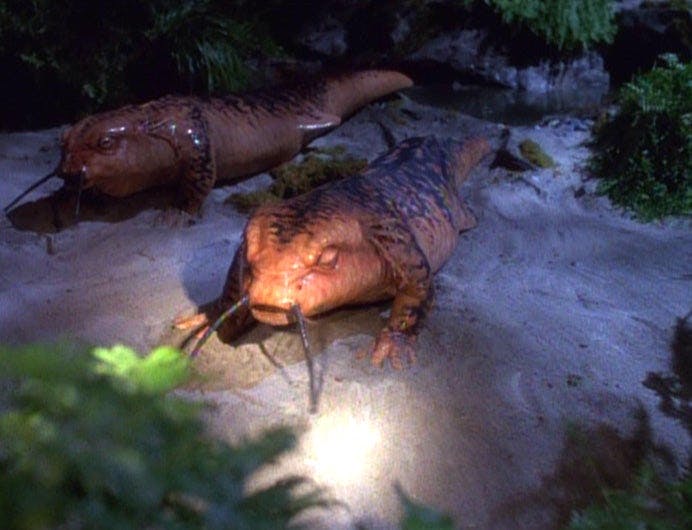
StarTrek.com
I am adding this episode as a bonus because it is universally reviled, but I’m including it here because, let me tell you, the hormonal experience of a pregnant and postpartum body is absolutely captured by Tom Paris during his fast-tracked sub-space lizard evolution. I had a pretty chill pregnancy, but when I stopped breast-feeding the hormonal fallout was intense. The most innocuous things infuriated me or made me cry and I felt like I had zero control over what was happening. I never bit off my tongue and vomited it out, but I did once walk into the house, take off my pants, scream “I need a milkshake,” and start crying. The episode did have some redeeming qualities, especially as it dabbled in body-horror, but I think everyone can agree they did not properly address the fact that Paris and Janeway made lizard babies and then left them on that planet. I rewatched this episode for this article and it is absolutely, delightfully unhinged!
---
Voyager’s themes of maternity, paternity, and parenthood are woven through the storylines and character arcs throughout Voyager’s run They show up prominently in some of the best (and a few of the worst) episodes. Captain Janeway’s journey reached me as I watched the series during midnight breastfeedings or as my kid — inexplicably awake at 5 AM — rested wide-eyed in my lap. Before we decided to add a third little person to our family I saw myself as someone committed to my career, focused on enjoying my life as it was; wife, dogs, work, indulging my penchant for purchasing ungodly expensive beers… the usual. So watching a show that begins when Janeway is ripped from her comfortable reality and dragged to an uncharted quadrant with no way back to what she knew? I felt that.
Motherhood (parenthood) drags you lightyears away from the life you understand and forces you to mark a new path through the unknown. Once my kid arrived she felt as foreign to me as a nebula full of omicron particles that turns out to be a giant space puppy. But now, two and a half years in, I could not be more grateful for this exciting, confusing, perilous, and life-changing journey. What was once uncharted space now feels right at home.
Allison (she/her) is a writer who lives on an island in the Puget Sound with her wife, toddler, two pugs, a cat, and four chickens. In her day job she is in digital strategy and in her spare time she enjoys writing about 90s video games, pop culture, and music. You can find her on Twitter @ATweetsville.

